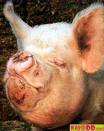Jul
10
You Can’t Tell a Hog What to Do
Filed Under Civilian life
 The women gathered to talk about living with husbands who had served their country years ago during the Vietnam War. They were from throughout the United States and worked in a variety of careers. They were mothers, teachers, business owners, and even farmers.
The women gathered to talk about living with husbands who had served their country years ago during the Vietnam War. They were from throughout the United States and worked in a variety of careers. They were mothers, teachers, business owners, and even farmers.
During the morning session, we discussed the challenges of being in a relationship with a spouse who had experienced the trauma of combat – the killing, the living and the dying. Several of the veterans had been “tunnel rats”, those individuals whose job was to slither down the narrow passageways in search of Viet Cong. The tunnels allowed the enemy to pop-up out of nowhere and ambush American troops. Many believed the job of the tunnel rat was one of the most dangerous and scary assignments in Vietnam.
Several participants told stories of how the war did not remain overseas, but seemed to follow the vet back home.
Orders were still shouted, commands were given at all times of the day and night, and immediate compliance was expected. The deep battle scars of many warriors still remained.
I mentioned this phenomenon in our book, Tears of a Warrior. How my sons and I never quite understood the condition. In fact, we never fully realized that we walked a fine line between soldiers in combat and family. Our perceptions of how to respond to Dad were not the same as his. As one might imagine, such a scenario did not always produce a tranquil home environment.
Toward the end of the discussion, one lady explained to the group how it wasn’t her husband who had the most difficulty adjusting to home life, it was her.
You see, she explained, she ran the farm while he was away. She had to take care of the crops, fix the barn when it leaked, repair any broken appliances, and feed the animals, especially the pigs.
When her husband returned after being gone over a year, he kept asking why she did certain tasks in a manner unfamiliar to him. Her dilemma was to become more flexible in allowing him to reintegrate into the farm tasks, and not expect him to do things “her” way. Most of the farm duties were just fine after awhile, except one. It seemed the hogs weren’t terribly fond of the “new” farm hand and much preferred the lady as their primary feeder.
For any of you who aren’t familiar with farming and hog behavior, the only piece of information you need to know is that you don’t mess with a hungry, snorting hog.

